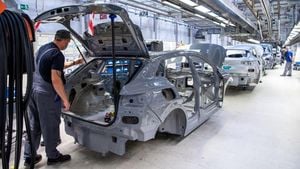Tens of thousands of Volkswagen workers are participating in strikes across Germany, marking the most significant walkouts at the automotive giant since 2018. The strikes, which began on December 2, 2024, were ignited by the company's plans to cut up to 10% of jobs and implement pay reductions. The protest is not only about wages; it also touches deep financial concerns, particularly the announced closures of at least three plants, which would be the first domestic plant closures for the company in its 87-year history.
The walkouts, organized by the labor union IG Metall, have spread to nine out of Volkswagen's ten plants around the country after the expiration of a 'peace obligation' between the company and the workers. This peace agreement, which had prohibited strikes, ended on Saturday night, paving the way for workers to take industrial action. Thorsten Gröger, the chief negotiator for IG Metall, emphasized the stakes involved, stating, "If necessary, this will become the toughest wage dispute Volkswagen has ever seen."
Gröger criticized the company's management, which he accused of exacerbation rather than resolution of the labor disputes. Further asserting the union's position, he remarked, "Volkswagen has set our collective bargaining agreements on fire, and instead of extinguishing this fire during three rounds of negotiations, the management board keeps throwing open barrels of gasoline onto it."
The warning strikes are planned to last several hours during the workday, impacting both morning and evening shifts. Although these initial strikes are limited, they could evolve; 24-hour strikes or indefinite stoppages could be scheduled if the situation does not improve and union members are consulted.
The backdrop of this bread-and-butter conflict is Volkswagen's significant financial struggles. The company has experienced dismal sales performance, particularly losing ground against rising competition from Chinese electric vehicle manufacturers. Just recently, VW reported profit declines of nearly 60%, followed by strategies to address these losses with deep budget cuts amounting to 18 billion euros ($19 billion) nationwide. The cuts entail altering company-wide benefits, including generous pension plans.
Volkswagen's troubles come at an unsettling time for the broader European automotive sector, which is facing mounting pressures from electrification efforts and slumping demand. This situation is emblematic of larger challenges facing Germany, whose export-heavy economy suffers under declining industrial orders and inflationary pressures exacerbated by rising energy costs.
Already, there are signs of significant political fallout. Chancellor Olaf Scholz's government is reeling from criticism related to the country's economic policies, which many view as insufficiently sturdy against local manufacturing demands. These economic realities are brewing tensions, particularly as Scholz attempts to form his new government amid fears surrounding Volkswagen's capacity to weather financial storms.
The union’s demands extend beyond mere financial concerns; workers are pressing for executives to participate more actively by taking virtual pay cuts to their bonuses during negotiations for collective bargaining agreements. Daniela Cavallo, the chair of Volkswagen’s works council, asserted these points during strikes, reinforcing employee resilience. "We demand for all to make their contributions – management and the shareholder side as well," said Cavallo from the picket line.
Volkswagen maintains its right to negotiate and addresses the union's proposals with caution. It concedes the validity of employee frustrations but argues the drastic measures are necessary for the long-term health of the company. Amid this chaos, executive management is boxed between labor demands and stringent market conditions.
Market analysts point to rising consumer demand, particularly for electric vehicles, which has not materialized for Volkswagen as anticipated. This inability to capture market share threatens not only Volkswagen's profitability but positions the company far behind competitors who have been more nimble and innovative during this shift away from traditional fuel sources.
What happens next could set the tone for not only Volkswagen’s future but also for the automotive manufacturing sector at large as they grapple with the impending changes of electro-mobility and the pressures of maintaining employee well-being. It remains to be seen whether the core issues will prompt lasting strikes or spur meaningful negotiations. For now, the workers’ message is clear: they won’t stand idly by as their livelihoods are threatened.



